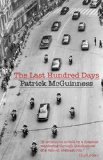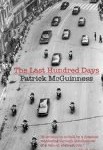 Long listed for 2011 Booker Prize
Long listed for 2011 Booker Prize
Five words from the blurb: Romanians, danger, corruption, destroy, Ceausescu
The Last Hundred Days explains what life was like for Romanians in the final months of Ceausescu’s reign. The story is told through the eyes of an English student who arrives in Bucharest after being given a job, despite not turning up for the interview. From the perspective of this outsider we see the destruction of the city, the corruption required to get everything from food to medical supplies, and the violence that regularly occurs.
The book was very well researched, giving a vivid snapshot of life in Bucharest during 1989. The problem was that it read like a non-fiction title. The detail will prove fascinating to anyone interested in researching the city, but is too much for the average reader.
I also found the writing to be quite detached. I couldn’t connect to any of the characters and so failed to form an emotional response to any of the scenes in the book, no matter how disturbing the content. The fact that the narrator was from England also added a level of detachment to the plot. As a newcomer to the city he couldn’t fully explain the pain that the residents felt seeing their city destroyed and there was always the knowledge that he could leave and return to his normal life at any point.
Unlike the majority of the Booker long list, this book did have a plot. The problem was that I didn’t really care about it – things happened, but I had no real interest in the outcome.
Despite these criticisms this book did engage me enough to read to the end. I learnt a lot about life under Ceausescu, including the fact that having a miscarriage was a crime.
A ‘celibacy tax’ was imposed on women who could have children but did not, while officials were sent to interrogate women about their sexual habits. ‘Anyone who avoids having children is a deserter,’ proclaimed Ceausescu, announcing the ‘Mama Eroica’ scheme to reward mothers with five or more children. But there was no milk, no food; it was impossible to find sterilised feeding equipment; electricity was now as random and inscrutable as Acts of God had been for ancient civilisations.
The book does a fantastic job of teaching the reader about this period of history, but if you like to form an emotional connection to the characters/plot then it probably isn’t for you.

.
The thoughts of other bloggers:
McGuinness has done an awe-inspiring job of capturing the sordid, decaying and disjointed “communist way of life” in Bucharest during the summer of ’89. Permanently Uncached
…factual mistakes started accruing at an alarmingly fast rate…. Fantasy Book Critic
I’d say the major flaw here was the disjointed nature of the story telling and the philosophical musings. Chazz W
